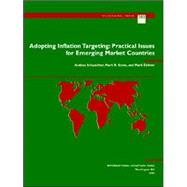Adopting Inflation Targeting: Practical Issues for Emerging Market Countries
, by Schaechter, Andrea; Stone, Mark R.; Zelmer, Mark- ISBN: 9781557759917 | 155775991X
- Cover: Paperback
- Copyright: 12/1/2000
In recent years, emerging market countries have joined industrial countries in adopting monetary policy frameworks of formal inflation targeting. Motivated by increased demand by emerging market countries for IMF technical assistance on inflation targeting, this paper summarises the advice of the IMF's Monetary and Exchange Affairs Department for emerging market countries on the institutional and operational practicalities of inflation targeting. The paper spells out the trade-offs raised in the formulation of an inflation targeting framework and describes the approaches to these trade-offs used by inflation targeting countries. The countries identified in the paper as practitioners of inflation targeting are those considered to have adopted most of the elements of a full-fledged inflation targeting framework. The inherent differences reported in this paper between the six emerging market inflation targeting countries - Brazil, Chile, the Czech Republic, Israel, Poland, and South Africa - and other emerging market countries may shed some light on the preferred starting point and conditions for inflation targeting. The information summarised in this paper suggests that emerging market countries, in comparison to industrial countries, seem to prefer a more formal institutional framework in support of inflation targeting. The legal frameworks of all inflation targeting countries explicitly set price or currency stability as the primary objective of the central bank and grant it instrument independence. The more formal institutional frameworks for inflation targeting in emerging market countries may reflect their much higher and more variable rates of inflation compared to industrial countries, less developed financial systems, greater vulnerability to inflationary monetisation of government debt, and greater susceptibility to exchange rate crises. One issue that cannot be resolved is whether an inflation targeting framework is suitable for countries that want to disinflate from higher rates of inflation. So far, no country with rate of inflation greater than 30 per cent has begun the transition to inflation targeting.







